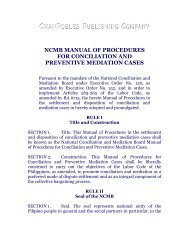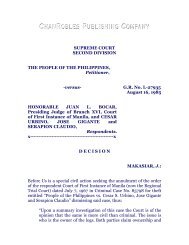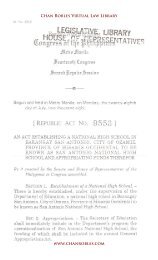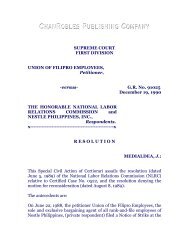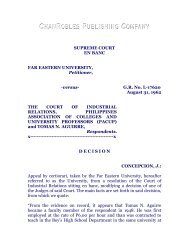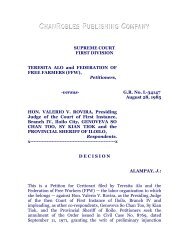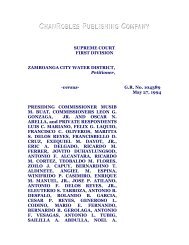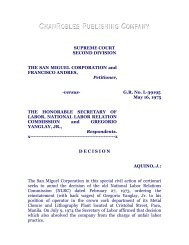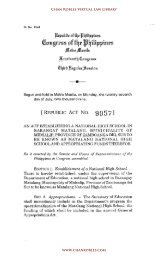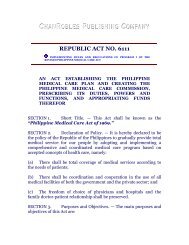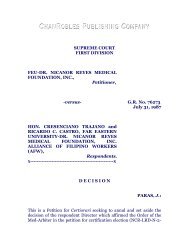World Health Organization vs. Aquino, 48 SCRA 242 - Chan Robles ...
World Health Organization vs. Aquino, 48 SCRA 242 - Chan Robles ...
World Health Organization vs. Aquino, 48 SCRA 242 - Chan Robles ...
Create successful ePaper yourself
Turn your PDF publications into a flip-book with our unique Google optimized e-Paper software.
SUPREME COURT<br />
FIRST DIVISION<br />
THE WORLD HEALTH<br />
ORGANIZATION and DR. LEONCE<br />
VERSTUYFT,<br />
Petitioners,<br />
-versus- G.R. No. L-35131<br />
November 29, 1972<br />
HON. BENJAMIN H. AQUINO, as<br />
Presiding Judge of Branch VIII, Court<br />
of First Instance of Rizal, MAJOR<br />
WILFREDO CRUZ, MAJOR ANTONIO<br />
G. RELLEVE, and CAPTAIN PEDRO S.<br />
NAVARRO of the Constabulary<br />
Offshore Action Center (COSAC),<br />
Respondents.<br />
x---------------------------------------------------x<br />
D E C I S I O N<br />
TEEHANKEE, J.:<br />
An Original Action for Certiorari and Prohibition to set aside<br />
respondent judge’s refusal to quash a search warrant issued by him at<br />
the instance of respondents COSAC (Constabulary Offshore Action<br />
Center) officers for the search and seizure of the personal effects of<br />
petitioner official of the WHO (<strong>World</strong> <strong>Health</strong> <strong>Organization</strong>)
notwithstanding his being entitled to diplomatic immunity, as duly<br />
recognized by the executive branch of the Philippine Government and<br />
to prohibit respondent judge from further proceedings in the matter.<br />
Upon filing of the petition, the Court issued on June 6, 1972 a<br />
restraining order enjoining respondents from executing the search<br />
warrant in question. chanroblespublishingcompany<br />
Respondents COSAC officers filed their answer joining issue against<br />
petitioners and seeking to justify their act of applying for and<br />
securing from respondent judge the warrant for the search and<br />
seizure of ten crates consigned to petitioner Verstuyft and stored at<br />
the Eternit Corporation warehouse on the ground that they “contain<br />
large quantities of highly dutiable goods” beyond the official needs of<br />
said petitioner “and the only lawful way to reach these articles and<br />
effects for purposes of taxation is through a search warrant.” [1] chanroblespublishingcompany<br />
The Court thereafter called for the parties’ memoranda in lieu of oral<br />
argument, which were filed on August 3, 1972 by respondents and on<br />
August 21, 1972 by petitioners and the case was thereafter deemed<br />
submitted for decision. chanroblespublishingcompany<br />
It is undisputed in the record that petitioner Dr. Leonce Verstuyft,<br />
who was assigned on December 6, 1971 by the WHO from his last<br />
station in Taipei to the Regional Office in Manila as Acting Assistant<br />
Director of <strong>Health</strong> Services, is entitled to diplomatic immunity,<br />
pursuant to the Host Agreement executed on July 22, 1951 between<br />
the Philippine Government and the <strong>World</strong> <strong>Health</strong> <strong>Organization</strong>. chanroblespublishingcompany<br />
Such diplomatic immunity carries with it, among other diplomatic<br />
privileges and immunities, personal inviolability, inviolability of the<br />
official’s properties, exemption from local jurisdiction, and exemption<br />
from taxation and customs duties. chanroblespublishingcompany<br />
When petitioner Verstuyft’s personal effects contained in twelve (12)<br />
crates entered the Philippines as unaccompanied baggage on January<br />
10, 1972, they were accordingly allowed free entry from duties and<br />
taxes. The crates were directly stored at the Eternit Corporation’s<br />
warehouse at Mandaluyong, Rizal, “pending his relocation into
permanent quarters upon the offer of Mr. Berg, Vice President of<br />
Eternit who was once a patient of Dr. Verstuyft in the Congo.” [2] chanroblespublishingcompany<br />
Nevertheless, as above stated, respondent judge issued on March 3,<br />
1972 upon application on the same date of respondents COSAC<br />
officers search warrant No. 72-138 for alleged violation of Republic<br />
Act 4712 amending section 3601 of the Tariff and Customs Code [3]<br />
directing the search and seizure of the dutiable items in said crates.<br />
Upon protest of March 6, 1972 of Dr. Francisco Dy, WHO Regional<br />
Director for the Western Pacific with station in Manila, Secretary of<br />
Foreign Affairs Carlos P. Romulo, personally wired on the same date<br />
respondent judge advising that “Dr. Verstuyft is entitled to immunity<br />
from search in respect of his personal baggage as accorded to<br />
members of diplomatic missions” pursuant to the Host Agreement<br />
and requesting suspension of the search warrant order “pending<br />
clarification of the matter from the ASAC.” chanroblespublishingcompany<br />
Respondent judge set the Foreign Secretary’s request for hearing and<br />
heard the same on March 16, 1972, but notwithstanding the official<br />
plea of diplomatic immunity interposed by a duly authorized<br />
representative of the Department of Foreign Affairs who furnished<br />
the respondent judge with a list of the articles brought in by<br />
petitioner Verstuyft, respondent judge issued his order of the same<br />
date maintaining the effectivity of the search warrant issued by him,<br />
unless restrained by a higher court. [4]<br />
Petitioner Verstuyft’s special appearance on March 24, 1972 for the<br />
limited purpose of pleading his diplomatic immunity and motion to<br />
quash search warrant of April 12, 1972 failed to move respondent<br />
judge. chanroblespublishingcompany<br />
At the hearing thereof held on May 8, 1972, the Office of the Solicitor<br />
General appeared and filed an extended comment stating the official<br />
position of the executive branch of the Philippine Government that<br />
petitioner Verstuyft is entitled to diplomatic immunity, he did not<br />
abuse his diplomatic immunity, [5] and that court proceedings in the<br />
receiving or host State are not the proper remedy in the case of abuse<br />
of diplomatic immunity. [6] chanroblespublishingcompany
The Solicitor General accordingly joined petitioner Verstuyft’s prayer<br />
for the quashal of the search warrant. Respondent judge nevertheless<br />
summarily denied quashal of the search warrant per his order of May<br />
9, 1972 “for the same reasons already stated in (his) aforesaid order of<br />
March 16, 1972” disregarding Foreign Secretary Romulo’s plea of<br />
diplomatic immunity on behalf of Dr. Verstuyft. chanroblespublishingcompany<br />
Hence, the petition at bar. Petitioner Verstuyft has in this Court been<br />
joined by the <strong>World</strong> <strong>Health</strong> <strong>Organization</strong> (WHO) itself in full<br />
assertion of petitioner Verstuyft’s being entitled “to all privileges and<br />
immunities, exemptions and facilities accorded to diplomatic envoys<br />
in accordance with international law” under section 24 of the Host<br />
Agreement. chanroblespublishingcompany<br />
The writs of certiorari and prohibition should issue as prayed for.<br />
1. The executive branch of the Philippine Government has<br />
expressly recognized that petitioner Verstuyft is entitled to diplomatic<br />
immunity, pursuant to the provisions of the Host Agreement. The<br />
Department of Foreign Affairs formally advised respondent judge of<br />
the Philippine Government’s official position that accordingly “Dr.<br />
Verstuyft cannot be the subject of a Philippine court summons<br />
without violating an obligation in international law of the Philippine<br />
Government” and asked for the quashal of the search warrant, since<br />
his personal effects and baggages after having been allowed free entry<br />
from all customs duties and taxes, may not be baselessly claimed to<br />
have been “unlawfully imported” in violation of the tariff and customs<br />
code as claimed by respondents COSAC officers. The Solicitor-<br />
General, as principal law officer of the Government, [7] likewise<br />
expressly affirmed said petitioner’s right to diplomatic immunity and<br />
asked for the quashal of the search warrant. chanroblespublishingcompany<br />
It is a recognized principle of international law and under our system<br />
of separation of powers that diplomatic immunity is essentially a<br />
political question and courts should refuse to look beyond a<br />
determination by the executive branch of the government, [8] and<br />
where the plea of diplomatic immunity is recognized and affirmed by<br />
the executive branch of the government as in the case at bar, it is then<br />
the duty of the courts to accept the claim of immunity upon<br />
appropriate suggestion by the principal law officer of the government,
the Solicitor General in this case, or other officer acting under his<br />
direction. [9] Hence, in adherence to the settled principle that courts<br />
may not so exercise their jurisdiction by seizure and detention of<br />
property, as to embarrass the executive arm of the government in<br />
conducting foreign relations, it is accepted doctrine that “in such<br />
cases the judicial department of (this) government follows the action<br />
of the political branch and will not embarrass the latter by assuming<br />
an antagonistic jurisdiction.” [10] chanroblespublishingcompany<br />
2. The unfortunate fact that respondent judge chose to rely on the<br />
suspicion of respondents COSAC officers “that the other remaining<br />
crates unopened contain contraband items” [11] rather than on the<br />
categorical assurance of the Solicitor-General that petitioner<br />
Verstuyft did not abuse his diplomatic immunity, [12] which was based<br />
in turn on the official positions taken by the highest executive officials<br />
with competence and authority to act on the matter, namely, the<br />
Secretaries of Foreign Affairs and of Finance, could not justify<br />
respondent judge’s denial of the quashal of the search warrant. chanroblespublishingcompany<br />
As already stated above, and brought to respondent court’s<br />
attention, [13] the Philippine Government is bound by the procedure<br />
laid down in Article VII of the Convention on the Privileges and<br />
Immunities of the Specialized Agencies of the United Nations [14] for<br />
consultations between the Host State and the United Nations agency<br />
concerned to determine, in the first instance the fact of occurrence of<br />
the abuse alleged, and if so, to ensure that no repetition occurs and<br />
for other recourses. This is a treaty commitment voluntarily assumed<br />
by the Philippine Government and as such, has the force and effect of<br />
law.<br />
Hence, even assuming arguendo as against the categorical assurance<br />
of the executive branch of government that respondent judge had<br />
some ground to prefer respondents COSAC officers’ suspicion that<br />
there had been an abuse of diplomatic immunity, the continuation of<br />
the search warrant proceedings before him was not the proper<br />
remedy. He should, nevertheless, in deference to the exclusive<br />
competence and jurisdiction of the executive branch of government to<br />
act on the matter, have acceded to the quashal of the search warrant,<br />
and forwarded his findings or grounds to believe that there had been<br />
such abuse of diplomatic immunity to the Department of Foreign
Affairs for it to deal with, in accordance with the aforementioned<br />
Convention, if so warranted. chanroblespublishingcompany<br />
3. Finally, the Court has noted with concern the apparent lack of<br />
coordination between the various departments involved in the<br />
subject-matter of the case at bar, which made it possible for a small<br />
unit, the COSAC, to which respondents officers belong, seemingly to<br />
disregard and go against the authoritative determination and<br />
pronouncements of both the Secretaries of Foreign Affairs and of<br />
Finance that petitioner Verstuyft is entitled to diplomatic immunity,<br />
as confirmed by the Solicitor-General as the principal law officer of<br />
the Government. Such executive determination properly<br />
implemented should have normally constrained respondents officers<br />
themselves to obtain the quashal of the search warrant secured by<br />
them rather than oppose such quashal up to this Court, to the<br />
embarrassment of said department heads, if not of the Philippine<br />
Government itself vis a vis the petitioners. [15] chanroblespublishingcompany<br />
The seriousness of the matter is underscored when the provisions of<br />
Republic Act 75 enacted since October 21, 1946 to safeguard the<br />
jurisdictional immunity of diplomatic officials in the Philippines are<br />
taken into account. Said Act declares as null and void writs or<br />
processes sued out or prosecuted whereby inter alia the person of an<br />
ambassador or public minister is arrested or imprisoned or his goods<br />
or chattels are seized or attached and makes it a penal offense for<br />
“every person by whom the same is obtained or prosecuted, whether<br />
as party or as attorney, and every officer concerned in executing it” to<br />
obtain or enforce such writ or process. [16] chanroblespublishingcompany<br />
The Court, therefore, holds that respondent judge acted without<br />
jurisdiction and with grave abuse of discretion in not ordering the<br />
quashal of the search warrant issued by him in disregard of the<br />
diplomatic immunity of petitioner Verstuyft. chanroblespublishingcompany<br />
ACCORDINGLY, the writs of certiorari and prohibition prayed for<br />
are hereby granted, and the temporary restraining order heretofore<br />
issued against execution or enforcement of the questioned search<br />
warrant, which is hereby declared null and void, is hereby made<br />
permanent. The respondent court is hereby commanded to desist
from further proceedings in the matter. No costs, none having been<br />
prayed for. chanroblespublishingcompany<br />
The clerk of court is hereby directed to furnish a copy of this decision<br />
to the Secretary of Justice for such action as he may find appropriate<br />
with regard to the matters mentioned in paragraph 3 hereof. So<br />
ordered.<br />
Concepcion, C. J., Makalintal, Zaldivar, Fernando, Barredo,<br />
Makasiar, Antonio and Esguerra, JJ., concur. chanroblespublishingcompany<br />
Castro, J., reserves his vote. chanroblespublishingcompany<br />
chanroblespublishingcompany<br />
[1] Respondents’ Answer, Rollo, p. 138.<br />
[2] Citygram of March 6, 1972 of Secretary of Foreign Affairs Carlos P. Romulo<br />
to respondent judge, Annex D, petition. chanroblespublishingcompany<br />
[3] This penal provision of the tariff & customs code imposes a penalty of a fine<br />
of not less than P600.00 nor more than P5000.00 and imprisonment for<br />
not less than 6 months nor more than two years for unlawful importation<br />
and illegal possession of goods imported contrary to law, upon “Any person<br />
who shall fraudulently import or bring into the Philippines, or assist in so<br />
doing, any article, contrary to law, or shall receive, conceal, buy, sell, or in<br />
any manner facilitate the transportation, concealment, or sale of such article<br />
after importation, knowing the same to have been imported contrary to<br />
law,” and states that “(W)hen, upon trial for a violation of this section, the<br />
defendant is shown to have or to have had possession of the article in<br />
question, such possession shall be deemed sufficient evidence to authorize<br />
conviction, unless the defendant shall explain the possession to the<br />
satisfaction of the court.” chanroblespublishingcompany<br />
[4] Respondent judge’s justification in his said order reads in part as follows:<br />
“From the reply submitted by Captains Pedro S. Navarro and Antonio G.<br />
Relleve of the COSAC, it appears that the articles contained in the two<br />
baggages allegedly belonging to Dr. Verstuyft so far opened by them are 120<br />
bottles of assorted foreign wine and 15 tins of PX goods which are said to be<br />
dutiable under the Customs and Tariff Code of the Philippines. The two<br />
COSAC officers further manifested that they positively believe that there are<br />
more contraband items in the nine other huge crates which are still<br />
unopened. The articles so far found in the two crates opened by Capt.<br />
Navarro and Relleve are not mentioned in the list of articles brought in by<br />
Dr. Verstuyft and are highly dutiable under the Customs and Tariff Code<br />
and according to said officers they have strong reasons to believe that the<br />
other remaining crates unopened contain contraband items. The Court is<br />
certain that the <strong>World</strong> <strong>Health</strong> <strong>Organization</strong> would not tolerate violations of<br />
local laws by its officials and/or representatives under a claim of immunity
granted to them by the host agreement. Since the right of immunity invoked<br />
by the Department of Foreign Affairs is admittedly relative and not absolute,<br />
and there are strong and positive indications of violation of local laws, the<br />
Court declines to suspend the effectivity of the search warrant issued in the<br />
case at bar.” chanroblespublishingcompany<br />
[5] Aside from the Foreign Affairs Department’s certification that the<br />
importation of 120 bottles of wine is “ordinary in diplomatic practice,” the<br />
Solicitor General took pains to inform the lower court that the packing of Dr.<br />
Verstuyft’s baggages and personal effects was done “by a packing company<br />
in Taipei (and) Dr. Verstuyft had no hand in the preparation of the packing<br />
list of his personal effects which has been assailed by ASAC agents. Also<br />
implicit from the foregoing is the fact that Dr. Verstuyft had no intention to<br />
violate Philippine laws by selling the 120 bottles of foreign wine and 15 tins<br />
of PX goods in the Philippines. Otherwise, he need not have stored the same<br />
at the Eternit Corporation where they may be subject to the probing eyes of<br />
government agents.” chanroblespublishingcompany<br />
[6] The Solicitor General cites that the Convention on the Privileges and<br />
Immunities of the Specialized Agencies of the U.N. adopted on Nov. 21,<br />
1947, and made applicable by ratification to the WHO contains Article VII<br />
on abuse of privilege, calling for consultations between the Host State and<br />
the U.S. agency concerned and in case no satisfactory result is reached for<br />
submittal to the International Court of Justice for determination whether<br />
“such an abuse has occurred,” and providing for the customary procedure of<br />
requiring the offending official’s departure in certain instances.<br />
[7] Section 1661, Rev. Administrative Code. chanroblespublishingcompany<br />
[8] See Trost <strong>vs</strong>. Tompkins, 44A. 2b 226. chanroblespublishingcompany<br />
[9] See Ins. Co., 24 N.E. 2d 81, 281 N.Y. 362, reversing 5 N.Y.S. 2d 295, 254<br />
App. Div. 511, reargument denied 26 N.E. 2d 808, 282 N.Y. 676, motion<br />
denied 29 N.E. 2d 939, 284 N.Y. 638 (27-5th D-1127). chanroblespublishingcompany<br />
[10] See, United States <strong>vs</strong>. Lee, 106 U.S. 196, 209, 1 S. Ct. 240, 27 L. Ed. 171; Ex<br />
parte Republic of Peru, 318 U.S. 578, 68 S. CT. 793, 87 L. Ed. 1014; Republic<br />
of Mexico <strong>vs</strong>. Hoffman, 324, U.S. 30, 35, 65 S. Ct. 530, 89 L. Ed. 729;<br />
Welleman <strong>vs</strong>. Chase Manhattan Bank 192 N.Y.S. 2d 469. chanroblespublishingcompany<br />
[11] Supra, fn. 4.<br />
[12] Supra, fn. 5.<br />
[13] Supra, fn. 6.<br />
[14] This Convention was adopted by the U.N. General Assembly on Nov. 21,<br />
1947; it was concurred in by the Philippine Senate under Sen. Resolution<br />
No. 21, May 17, 1949; and the Philippine Instrument of Ratification was<br />
signed by the President of the Republic on Feb. 21, 1959 applying the<br />
Convention to the WHO. See 45 O.G. 3187 (1949) and Vol. I, Phil. Treaty<br />
Series, p. 621. chanroblespublishingcompany<br />
[15] In their answer to petition, respondents COSAC officers insist on their<br />
“belief and contention” that the 120 bottles of foreign wine found by them<br />
“are far in excess, considered by any reasonable standard of taste and<br />
elegance in the diplomatic world of the official mission and needs of a<br />
diplomat, much more of the status of (petitioner), hence, they should be
taxed” and on their “conviction that the articles and effects are not in fact<br />
and in truth personal effects so as to be comprehended within the privileges<br />
and immunities accorded representatives of (WHO).” Rollo, pp. 138-139.<br />
[16] The pertinent section of Rep. Act 75, entitled “An act to penalize acts which<br />
would impair the proper observance by the Republic and inhabitants of the<br />
Philippines of the immunities, rights and privileges of duly accredited<br />
foreign diplomatic and consular agents in the Philippines,” reads: “Any writ<br />
or process sued out or prosecuted by any person in any court of the Republic<br />
of the Philippines, or by any judge or justice, whereby the person of any<br />
ambassador or public minister of any foreign State, authorized and received<br />
as such by the President, or any domestic or domestic servant of any such<br />
ambassador or minister is arrested or imprisoned, or his goods or chattels<br />
are distrained, seized, or attached, shall be deemed void, and every person<br />
by whom the same is obtained or prosecuted, whether as party or as<br />
attorney, and every officer concerned in executing it, shall upon conviction,<br />
be punished by imprisonment for not more than three years and a fine of<br />
not exceeding two hundred pesos in the discretion of the court.” (Section 4,<br />
italics supplied) As to whether this Act may be invoked on behalf of<br />
petitioner (who does not pertain to the foreign diplomatic corps), quaere.



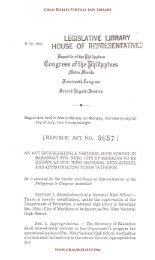
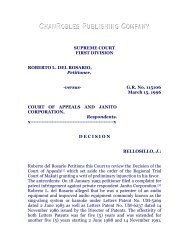
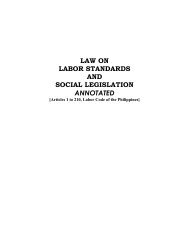
![Aurelio vs. NLRC, (221 SCRA 432 [1993]) - Chan Robles and ...](https://img.yumpu.com/51280528/1/190x245/aurelio-vs-nlrc-221-scra-432-1993-chan-robles-and-.jpg?quality=85)
